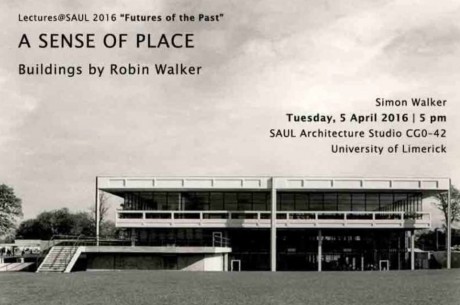A Sense Of Place. Buildings by Robin Walker
5 April 2016 5:00 pm at SAUL Studio
Speaker: Simon Walker
Modern architecture in Ireland reached a high point in the early 1960s and one of its most celebrated figures was Robin Walker. Born in Waterford in1924, Robin Walker studied architecture at University College Dublin from 1942 to 1947, and later under the legendary Le Corbusier. He also worked alongside Mies van der Rohe in Chicago. Upon his return to Ireland he became a key agent in the shaping of the emerging modern nation. This talk discusses a selection of his projects, showing drawings, models and photos of the original buildings. It will further consider the rehabilitation of these and other structures, and explain relevant examples.
Simon Walker is an architect in private practice in Dublin since 1997, currently engaged in a variety of projects including private houses, urban space and renewal projects, apartment buildings, health care facilities as well as furniture design and commercial work. His work has been widely published and won several awards. He has also been involved in designing and curating several exhibitions of architecture. Since 1993 Simon has been teaching in different positions at UCD and DIT until he joined SAUL in 2009. In 2015 he curated the exhibition A Sense of Place with scale models of Robin Walker’s projects in Scott Tallon Walker and edited a collection of his father’s writings. Simon is currently chair of the Irish chapter of DoCoMoMo International, an organisation dedicated to the conservation of buildings and sites of the Modern Movement.
“Futures of the Past” looks at buildings of the past and how we think about their future. Aware of the necessarily creative and destructive role of architecture we hold a deep interest in what exists. This series of talks is a public forum intended to address a range of questions on architecture’s role, past and present. The current suite of lectures focuses on architects in the role of curators of historic buildings as well as the technologies of preservation.

